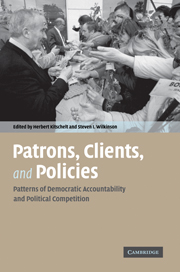Book contents
- Frontmatter
- Contents
- List of figures
- List of tables
- Acknowledgments
- List of contributors
- 1 Citizen–politician linkages: an introduction
- 2 Meet the new boss, same as the old boss? The evolution of political clientelism in Africa
- 3 Monopoly and monitoring: an approach to political clientelism
- 4 Counting heads: a theory of voter and elite behavior in patronage democracies
- 5 Explaining changing patterns of party–voter linkages in India
- 6 Politics in the middle: mediating relationships between the citizens and the state in rural North India
- 7 Rethinking economics and institutions: the voter's dilemma and democratic accountability
- 8 Clientelism and portfolio diversification: a model of electoral investment with applications to Mexico
- 9 From populism to clientelism? The transformation of labor-based party linkages in Latin America
- 10 Correlates of clientelism: political economy, politicized ethnicity, and post-communist transition
- 11 Political institutions and linkage strategies
- 12 Clientelism in Japan: the importance and limits of institutional explanations
- 13 The demise of clientelism in affluent capitalist democracies
- 14 A research agenda for the study of citizen–politician linkages and democratic accountability
- References
- Index
14 - A research agenda for the study of citizen–politician linkages and democratic accountability
Published online by Cambridge University Press: 27 October 2009
- Frontmatter
- Contents
- List of figures
- List of tables
- Acknowledgments
- List of contributors
- 1 Citizen–politician linkages: an introduction
- 2 Meet the new boss, same as the old boss? The evolution of political clientelism in Africa
- 3 Monopoly and monitoring: an approach to political clientelism
- 4 Counting heads: a theory of voter and elite behavior in patronage democracies
- 5 Explaining changing patterns of party–voter linkages in India
- 6 Politics in the middle: mediating relationships between the citizens and the state in rural North India
- 7 Rethinking economics and institutions: the voter's dilemma and democratic accountability
- 8 Clientelism and portfolio diversification: a model of electoral investment with applications to Mexico
- 9 From populism to clientelism? The transformation of labor-based party linkages in Latin America
- 10 Correlates of clientelism: political economy, politicized ethnicity, and post-communist transition
- 11 Political institutions and linkage strategies
- 12 Clientelism in Japan: the importance and limits of institutional explanations
- 13 The demise of clientelism in affluent capitalist democracies
- 14 A research agenda for the study of citizen–politician linkages and democratic accountability
- References
- Index
Summary
The systematic study of citizen-politician linkage mechanisms of accountability and responsiveness is challenging because we lack good comparative and historical data on both the exchanges involved, as well as on the non-clientelistic factors that might potentially also explain the political or economic outcomes in which we're interested. There are obvious reasons for voters and politicians to hide information on clientelistic exchanges: to deter competitors, to avoid social opprobrium, as well as to avoid prosecution. So in the absence of good data social scientists have been forced to rely on often-excellent qualitative studies on specific practices in individual countries, or on indirect quantitative tracers of such practices enabled by the idiosyncratic data opportunities in a single country.
The studies assembled in this book, as well as the Introduction, primarily speak to the theoretical questions of (1) how to conceptualize alternative citizen-politician linkage mechanisms in democratic polities and (2) how to explain the empirical variation in linkage practices across polities and parties as our dependent variable. Empirically, the studies rely on qualitative cross-national assessments (e.g., contributions by Kitschelt, Levitsky, Müller, and van de Walle), on unique subnational quantitative measures not available in a cross-national framework (such as in Magaloni, Diaz-Cayeros, and Estévez, Wilkinson, Lyne, or in Scheiner), or on observation-based narratives (such as Krishna, Chandra, or Levitsky). Given this state of affairs, we need to start thinking about how to make advances in empirical research on democratic linkage mechanisms beyond the status quo.
- Type
- Chapter
- Information
- Patrons, Clients and PoliciesPatterns of Democratic Accountability and Political Competition, pp. 322 - 343Publisher: Cambridge University PressPrint publication year: 2007
- 11
- Cited by



